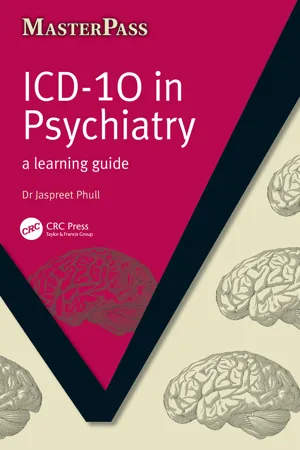
ICD 10 in Psychiatry
A Learning Guide
Jaspreet Phull
- 164 Seiten
- English
- ePUB (handyfreundlich)
- Über iOS und Android verfügbar
ICD 10 in Psychiatry
A Learning Guide
Jaspreet Phull
Über dieses Buch
Core to psychiatry is the practice of assessment, diagnosis and management. All three elements are subject to identifying the correct diagnosis and all three influence the clinical management of individuals with a mental disorder. This easy-to-comprehend, list-based book presents mnemonics to aid immediate recall of the International Classification of Diseases and Related Health Problems (ICD 10) for prompt diagnosis in psychiatry. Used in conjunction with other ICD 10 guides, this remarkable resource is ideal for memorising the myriad complexities of the ICD 10 for anyone with an interest in learning about diagnostic coding in psychiatry including medical students, psychiatry trainees and mental health professionals. During my time revising for my psychiatry postgraduate examinations, I found learning of ICD 10 for diagnosis particularly testing, especially given the depth and complexity of the criteria. I found aide memoires in the form of mnemonics particularly helpful to support my learning of the subject, allowing for much more efficient recall. From the Preface
Häufig gestellte Fragen
Information
Chapter 1
Organic mental disorders (F00–F09)
General criteria for dementia (G1–G4)
MATES
F00 Dementia in Alzheimer’s disease
- 1. General (G1–G4) criteria for dementia are met
- 2. No evidence for any other causes for the dementia (e.g. HIV, reversible causes of dementia, etc.)
- 1. Criteria for F00 met, and age of onset should be below 65 years
- 2. One of the following met:
- i. Rapid onset and progression
- ii. In addition to memory impairment, must be aphasia, agraphia, alexia, acalculia or apraxia (5As – signs of cortical dysfunction)
DRAMA
- 1. Criteria for F00 met
- 2. One of the following:
- i. Slow onset and progression (usually identified after 3 years or more)
- ii. Predominance of a memory impairment, over intellectual impairment
SAM
F01 Vascular dementia
- 1. unilaterally increased tendon reflexes R
- 2. an extensor plantar response E
- 3. pseudobulbar palsy P
- 4. unilateral spastic weakness of the limbs S (REPS)
CoUGH
- A. Criteria for F01 met (CoUGH)
- B. Dementia develops rapidly, i.e. usually within one month (but not longer than three months) after a succession of strokes or after a single infarct
- A. Criteria for F01 met (CoUGH)
- B. Onset is gradual within 3–6 months following a number of minor ischaemic episodes
- A. Criteria for F01 met (CoUGH)
- B. Hypertension history
- C. Clinical examination and investigations show vascular disease in the deep white matter of the cerebral hemispheres, with preservation of the cerebral cortex